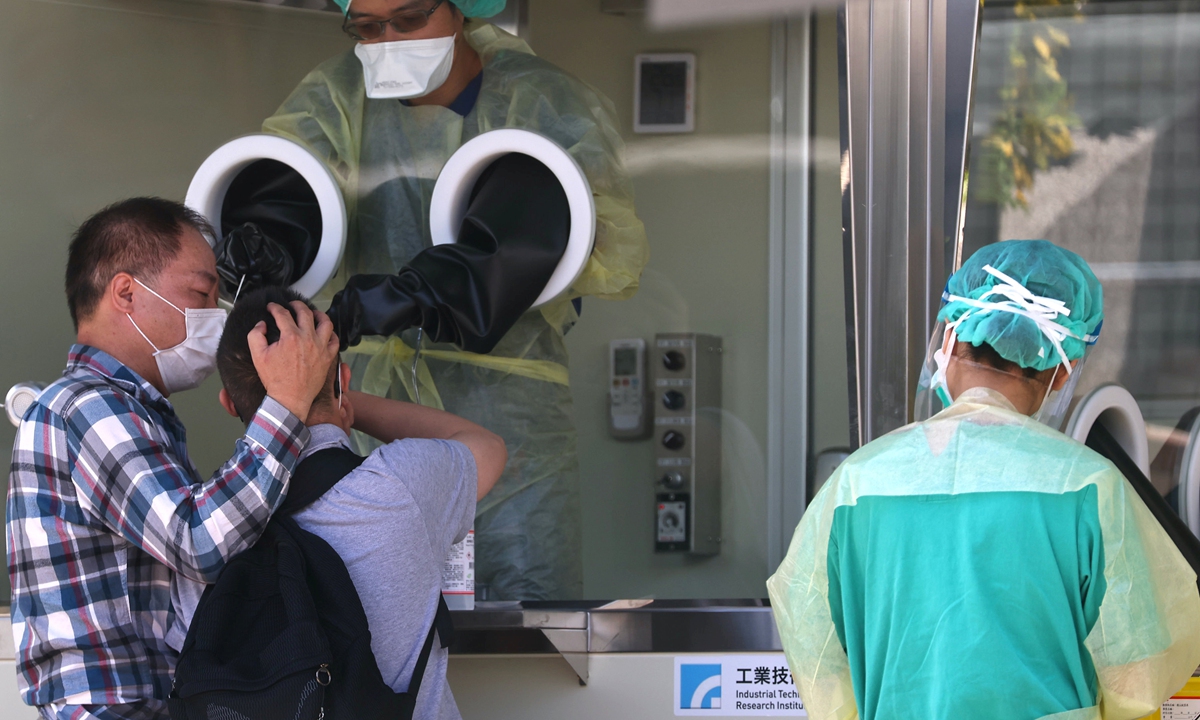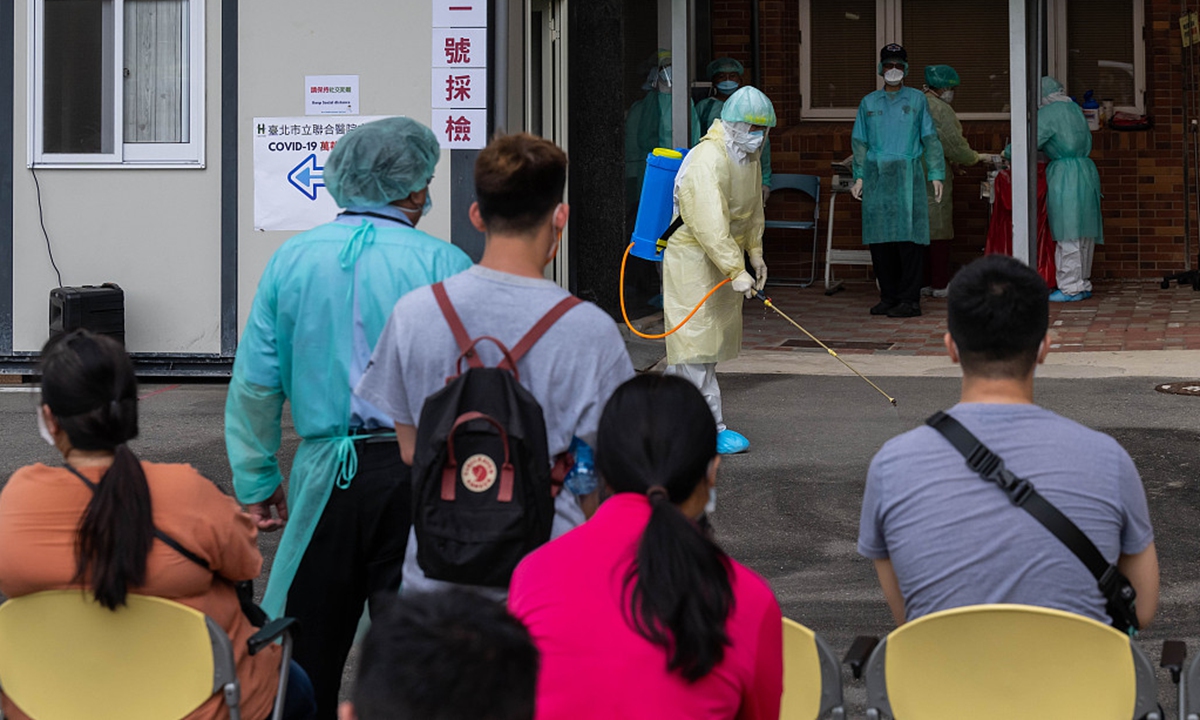DPP's pursuit of political interests comes at cost of people's lives amid rampant COVID-19 situation: observers
DPP's pursuit of political interests comes at cost of people's lives: observers

Residents of the island of Taiwan take rapid test for COVID-19 on Tuesday. The island reported 281 new locally transmitted COVID-19 cases and six deaths, bringing the death toll to 35, on Tuesday and local authorities decided to extend Level 3 Alert until June 14. Photo: IC
Turning a blind eye to the increasingly rampant outbreak of COVID-19 epidemic on the island of Taiwan, with new local cases growth at a record high, the secessionist Democratic Progressive Party (DPP) authority has yet to waver in its pursuit of secessionism and profits at the cost of Taiwan residents' lives, as it refuses to adopt the universal measures used by the Chinese mainland, which had proved effective in taming the outbreak in the mainland, observers said on Thursday.
The local Taiwan epidemic command center reported 401 new cases of COVID-19 infections and 13 deaths on Thursday, both setting single-day record highs.
The number of infection cases since the latest surge started on May 11 has reached 5,499. The rate of severe illness has also climbed to a record high of 6.9 percent, local media reported.
Having rejected mainland vaccines and ignored officials' cries to purchase those via local retailers, Taiwan's health authority on Thursday said that 150,000 out of 410,000 AstraZeneca doses that have recently undergone inspection will be dispatched to medical workers across the island, which has 23 million people.
With a total of 710, 000 doses, the island local epidemic command center said on Thursday that the first batch of 150,000 doses of Moderna COVID-19 vaccine would arrive on the island on Friday.
Aside from the vaccine shortage, the situation on the island - self-proclaimed as an "excellent student in anti-epidemic campaigns," - has exposed serious problems in almost every aspect of the viral combat.

A healthcare worker sprays disinfectant on the floor at a hospital while people wait in line for nucleic acid tests in Taipei, island of Taiwan, on Monday. Photo: VCG
Wu Ming-shiang, head of "National" Taiwan University Hospital, the most prestigious medical facility located in Taipei, cried for help through his Facebook post on Tuesday, saying that the hospital was overloaded with COVID-19 patients - even after it had converted the pediatric and intensive care units to treat adult patients. He even warned that the situation would become as terrible as the SARS outbreak.
On the same day, the union of Taipei City Hospital said through a Facebook post that the hospital's capacity is collapsing and "we really don't know what to do."
"Emergency rooms are overflowing, wards are full but ambulances continue to bring patients in… There were many patients lying in the corridor… all we can do is to comfort patients by saying 'just wait and see if there's a room,' 'I know you're wheezing, but there's no bed with ventilators'."
"We would like to ask, if, as officials say, Taiwan has enough medical care, why is this happening?" read the post.
Observers said the best way to curb the epidemic at this stage is by applying lockdowns, conducting universal testing and building makeshift hospitals, but the DPP has been reluctant to take these actions because the mainland successfully tamed the virus with these methods, and copying the mainland would be admitting its own failure.
The head of Taiwan's health authority, Chen Shih-chung, rejected the idea of constructing makeshift hospitals as proposed by opposition parties a week earlier, and he was slammed as putting politics and anti-mainland sentiment over people's lives.
"The battle against the epidemic in Taiwan is unfortunately based on anti-mainland sentiment… And if the DPP authority doesn't change, any hope of bringing the epidemic under control will be dim," Huang Chih-hsien, an expert on cross-Straits relations and a TV commentator from Taiwan, told the Global Times on Thursday.
The island announced on Tuesday that it had decided to extend the level-three emergency alert to June 14.
Despite repeated advice from public health experts, who have called for community nucleic acid testing to find potential infection chains, the DPP authority has never listened, even this time, Huang said.
Kinmen county on Monday announced that it would start an airport screening station, and passengers without nucleic acid test certificates would have to be tested on arrival. However, the Taiwan health authority canceled that stipulation later, saying local officials "should be in step with" the top authority, Taiwan media reported.
Huang accused the DPP of being anti-science in its decision to reject universal screening, which may have been motivated by an intention to avoid detecting too many cases and harming the public confidence in the DPP.
Facing the crisis, as usual, Taiwan regional leader Tsai Ing-wen chose to accuse the Chinese mainland in order to shift public discontent. Tsai said on Wednesday that the island had negotiated vaccine contracts with some Western manufacturers, but the deals were held up due to the mainland's "intervention."
Wang Jianmin, a senior cross-Straits expert at Minnan Normal University, told the Global Times on Thursday that as the epidemic worsens in the island, DPP authorities are acting contrary to public expectations by prioritizing politics over people's health.
A Taiwan local poll released on Wednesday showed that those who approved of the way Tsai was handling affairs plunged to 45.7 percent in May from 54.4 percent in April, while those who disapproved jumped to 41.3 percent from 29.9 percent.
Wang said that despite the decline in support, Tsai's approval rating of more than 40 percent shows that there is still a market for anti-mainland ideological narratives.
"There is still a lack of strong pressure from the opposition camp or tough public opinion that would force Tsai to deeply reflect and make changes," said Wang.
Even though Taiwan had pinned its hopes on the US for vaccine supplies, on Wednesday, Washington's representative in Taipei said the island's infection numbers remained low, which observers viewed as an indirect way of rejecting Taiwan's request.
Experts said the reason that the DPP authority is keeping the door closed to mainland vaccines, even after being snubbed by the US, is that it decided to hang on until July and August, when a locally made vaccine is expected to become available.
"The Taiwan-made vaccine will only be in Phase-II clinical trials at that time and will not be certified internationally… But when the time comes, people on the island will have no choice but to be inoculated with it," Huang said. "Manufacturers will make a fortune, and the DPP has huge interests and connections with manufacturers."

